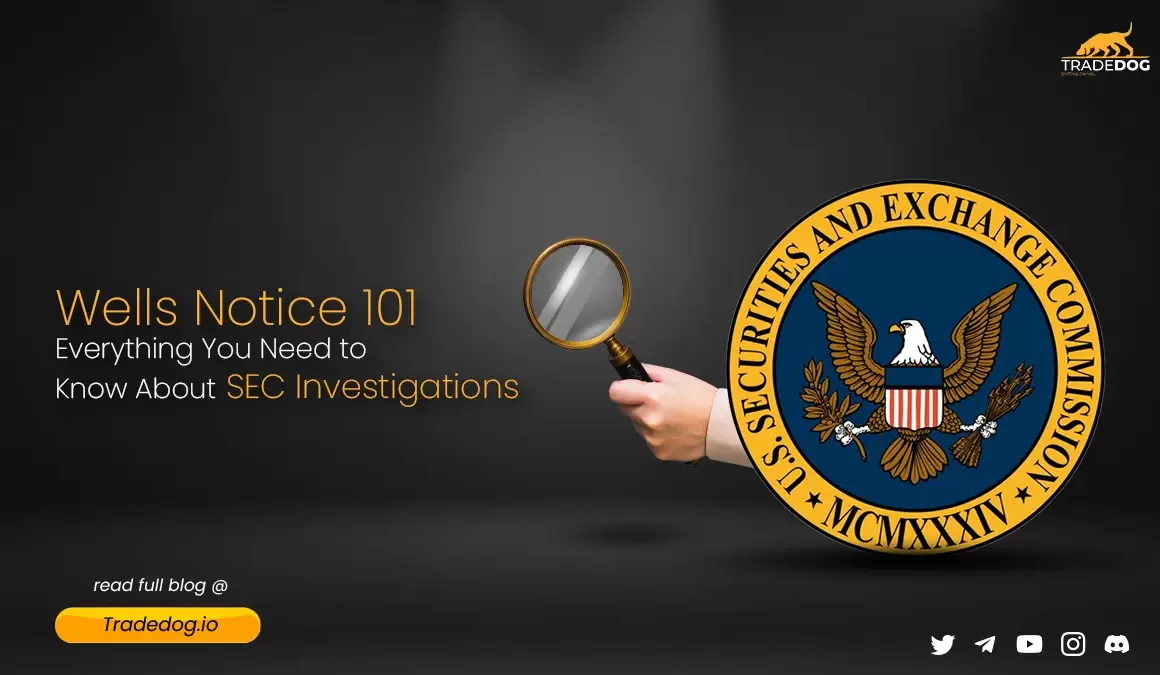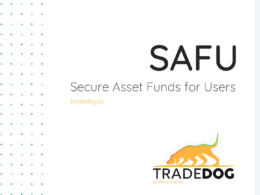Quick Links
- Impact of Wells Notice
- Options for Responding to a Wells Notice
- How Investors can use the Wells Notice to inform their Investment Decision
- Risks and Rewards of Investing in a Company that Has Received a Wells Notice
- High-Profile Cases that Involved Wells Notice
- Closing Thoughts: Important of Wells Notice for Securities and Crypto Market
Coinbase, the popular cryptocurrency exchange, received a Wells notice from the Securities and Exchange Commission (SEC) in March 2021, stating that the SEC believes that the exchange was offering and selling unregistered securities, a violation of federal law. The notice specifically targeted Coinbase’s spot trading, staking, custody, and institutional trading businesses, which the SEC claimed were at risk. This notice puts Coinbase at risk of being forced to close down those units, setting an important precedent for the regulation of the cryptocurrency industry in the United States.
Recently coinbase responded to the allegations with a response. Let’s dive into this blog and understand in depth the coinbase case.
A Wells Notice is a letter issued by the U.S. Securities and Exchange Commission (SEC) to a person or company indicating that the agency is considering bringing enforcement action against them. The notice generally outlines the conduct under investigation. It allows the recipient to respond before any formal charges are filed.
The Wells Notice process is designed to allow the recipient to present their side of the story and arguments against the charges. The recipient can respond by providing a written submission, requesting an in-person meeting with the SEC staff, or both. Based on the recipient’s response, the SEC may drop the charges or move forward with an enforcement action.
Impact of Wells Notice
The impact of a Wells Notice on a company’s stock price or token and public perception can vary depending on the specific circumstances and details of the situation. In some cases, the announcement of a Wells Notice may harm the company’s stock price or token value, as investors may view it as a sign of potential legal trouble and uncertainty.
Additionally, the public perception of a company may be affected by the announcement of a Wells Notice. Consumers and other stakeholders may view the notice as a sign of unethical or illegal behaviour, which could lead to reputational damage for the company.
If the company responds effectively and can resolve the issue without any legal action, it may be able to mitigate the negative impact on its stock price or token value and public perception. On the other hand, if the company is found to have violated securities laws and is subject to enforcement action, the impact on its stock price or token value and public perception could be more significant.
In summary, the impact of a Wells Notice on a company’s stock price or token value and public perception can vary and will depend on the specific circumstances of the situation. Companies need to respond effectively and transparently to the notice and work to resolve any issues to minimize the negative impact on their reputation and financial performance.
Options for Responding to a Wells Notice
When a company receives a Wells Notice from the SEC, it has several options for responding. These options include:
- Requesting a Meeting: The company can request a meeting with the SEC staff to discuss the allegations and provide additional information or evidence. This can be an opportunity for the company to clarify any misunderstandings and present its side of the story.
- Negotiating a Settlement: The company can negotiate a settlement with the SEC, which typically involves paying a fine or agreeing to certain conditions or restrictions. This option can be beneficial if the company wants to avoid a lengthy and costly legal battle.
- Challenging the Allegations: The company can challenge the allegations by contesting the SEC’s findings and presenting evidence to support its position. This option is typically pursued if the company believes that it has a strong case and can successfully defend itself in court.
- Accepting the Allegations: The company can accept the allegations and take steps to address any violations or non-compliance issues. This option is typically pursued if the company believes that it has no viable defence and wants to avoid further legal action.
The company needs to work closely with legal and financial experts when responding to a Wells Notice, as the response can have significant implications for the company’s reputation, financial performance, and legal standing. The company should also be transparent and cooperative with the SEC throughout the process to demonstrate its commitment to compliance and accountability.
How Investors can use the Wells Notice to inform their Investment Decision
Investors can use a Wells Notice to keep a note of their investment decisions in several ways. Here are some of the most common ways investors can use this information:
- Assessing the Risk: A Wells Notice is a signal that the SEC is investigating a company for alleged violations of securities laws. Accordingly, investors can use this information to assess the potential risk associated with investing in that company. If the allegations are serious and the company is found to have violated securities laws, it could lead to significant fines, legal costs, and reputational damage, which could negatively impact the company’s financial performance and stock price.
- Evaluating the Company’s Response: Investors can evaluate the company’s response to the Wells Notice to determine how well the company is handling the situation. If the company responds proactively and transparently, it could be a sign that the company is taking the allegations seriously and is committed to resolving the issue. On the other hand, if the company is unresponsive or dismissive of the allegations, it could be a red flag for investors.
- Monitoring the Situation: Investors can monitor the situation closely to stay informed about any developments related to the Wells Notice. This can include tracking news articles, SEC filings, and other public information related to the investigation. This information can help investors stay informed about the potential impact of the investigation on the company’s financial performance and stock price.
- Consulting with Financial Advisors: Finally, investors can consult with financial advisors or other experts to get a more informed perspective on the potential impact of the Wells Notice on the company and its stock price. Financial advisors can provide insights and analysis that can help investors make more informed investment decisions.
It is also important to note that receiving a Wells Notice does not necessarily mean that the company has committed any wrongdoing, and investors should carefully evaluate all available information before making any investment decisions.
Risks and Rewards of Investing in a Company that Has Received a Wells Notice
Investing in a company that has received a Wells Notice can be risky, as it indicates that the SEC has found potential violations of securities laws or regulations. This could lead to negative consequences for the company, such as fines, sanctions, or other penalties, which could in turn harm the company’s financial performance and impact the value of its stock. On the other hand, if the company can successfully navigate the SEC’s investigation and avoid or mitigate any enforcement action, the stock could potentially rebound and provide significant returns for investors. However, it is important to remember that investing always carries risk, and there is no guarantee that any investment will result in positive returns.
High-Profile Cases that Involved Wells Notice
Some high-profile cases that have involved Wells Notices include:
- Martha Stewart: In 2002, Martha Stewart, a celebrity chef and lifestyle guru, was investigated for insider trading related to the sale of shares of ImClone Systems. In 2003, the SEC sent her a Wells Notice, and in 2004, she was indicted and found guilty of obstruction of justice and making false statements to investigators. She served five months in prison.
- Goldman Sachs: In 2010, the SEC sent a Wells Notice to Goldman Sachs, alleging that the company had misled investors in a complex mortgage investment known as Abacus. The case went to trial, and in 2012, Goldman Sachs agreed to pay a $550 million settlement to resolve the allegations.
- JPMorgan Chase: In 2013, the SEC sent a Wells Notice to JPMorgan Chase, alleging that the company had misled investors in the lead-up to the financial crisis by failing to disclose certain information about its mortgage-backed securities. The case was settled for $153.6 million.
- Tesla: In 2018, the SEC sent a Wells Notice to Tesla CEO Elon Musk, alleging that he had made false and misleading statements on Twitter about taking the company private. Musk settled the case for $40 million and agreed to step down as chairman of the company’s board for three years.
- Theranos: In 2018, the SEC sent a Wells Notice to Theranos founder Elizabeth Holmes, alleging that she had misled investors about the company’s technology and business prospects. Holmes settled the case for $500,000 and agreed to give up control of the company.
These cases illustrate the serious consequences that can arise from receiving a Wells Notice and the importance of responding effectively to such allegations.
Recently, Coinbase Global, Inc., the leading U.S. cryptocurrency exchange, received a Wells Notice from the SEC indicating that the SEC plans to take enforcement action against Coinbase for its planned launch of a lending product called “Lend.” The SEC has expressed concern that the product may be considered a security and therefore subject to regulation under U.S. securities laws.
The SEC pressure on Coinbase has reportedly already ended the company’s staking reward product for at least one crypto token, Algorand. Coinbase is confident in the way it runs its business and is looking into building a new crypto marketplace outside the US.
Coinbase has responded to the Securities and Exchange Commission’s (SEC) Wells notice, stating that an enforcement action would present “major programmatic risks” to the SEC and that it would “fail on the merits.” The Wells notice alleged that Coinbase was offering and selling unregistered securities, which could force the closure of its spot trading, staking, custody, and institutional trading businesses. Coinbase argues that proposed charges rely on “flawed and untested” theories involving investment contracts, spot markets, and custody services. The company also issued a point-by-point repudiation of Howey’s applicability to the exchange’s staking service, stating that it failed all four prongs of the Howey test. Coinbase executives have been signalling for months that the company is ready to grapple with the SEC in a case that could have implications for the entire crypto industry in the US.
In the past, there have been several cases where companies received Wells Notices and were later fined or penalized by the SEC. For example, in 2016, the SEC issued a Wells Notice to Wells Fargo related to its sales practices, and in 2018, the SEC issued a Wells Notice to Tesla related to statements made by CEO Elon Musk on social media.
Closing Thoughts: Important of Wells Notice for Securities and Crypto Market
In today’s securities and crypto market, understanding the Wells Notice process is crucial for investors, companies, and other market participants. The Wells Notice serves as an important tool for the SEC to investigate potential violations of securities laws and regulations and provides recipients with an opportunity to respond to the allegations before any formal enforcement action is taken.
For investors, understanding the Wells Notice process can help them to evaluate the potential risks and opportunities associated with investing in a particular company or industry. Companies that receive a Wells Notice should take the matter seriously and work to address any concerns raised by the SEC to maintain investor confidence and avoid potential penalties or fines.
In the rapidly evolving crypto market, the regulatory landscape is still developing, and companies may face unique challenges related to compliance with securities laws and regulations. By staying informed about the Wells Notice process and other regulatory developments, companies can better position themselves to succeed and grow while maintaining compliance with applicable laws.
In conclusion, understanding the Wells Notice process is important for investors, companies, and other market participants in today’s securities and crypto market. By remaining informed and proactive, companies and investors can work together to promote a healthy and transparent market that benefits everyone involved.













